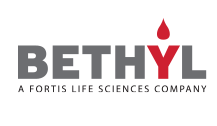Rabbit anti-SART3/TIP110 Antibody Affinity Purified

Product Details
Specifications
The epitope recognized by A301-521A maps to a region between residue 600 and 650 of human squamous cell carcinoma antigen recognized by T-cells 3 (Tat-interacting protein of 110 kDa) using the numbering given in entry NP_055521.1 (GeneID 9733).
Immunoglobulin concentration was determined using Beer’s Law where 1mg/mL IgG has an A280 of 1.4. Antibody was affinity purified using an epitope specific to SART3/TIP110 immobilized on solid support.
The epitope recognized by A301-521A-T maps to a region between residue 600 and 650 of human squamous cell carcinoma antigen recognized by T-cells 3 (Tat-interacting protein of 110 kDa) using the numbering given in entry NP_055521.1 (GeneID 9733).
Additional Product Information
SART3 (squamous cell carcinoma antigen recognized by T cells 3) was identified as an antigenic peptide expressed in esophageal cancer cells that is recognized by cytotoxic T lymphocytes. Originally, in a search for a U6 small nuclear RNA capping enzyme, SART3 was identified as a 110kDa nuclear RNA-binding protein. Later, by database searching, SART 3 was determined to also be the human ortholog of the yeast Prp24 snRNP recycling factor that functions in the reassembly of the U4/U6 snRNP during the recycling phase of the splicesome cycle. Recently, SART3-derived peptides have been investigated as candidates for peptide-based immunotherapy in prostate cancer patients due to their ability to induce cytotoxic T lymphocyte activity against prostate cancer cells.
Alternate Names
DSAP1; HIV-1 Tat-interacting protein of 110kDa; hSART-3; P100; p110; p110 nuclear RNA-binding protein; p110(nrb); RP11-13G14; SART-3; squamous cell carcinoma antigen recognized by T cells 3; squamous cell carcinoma antigen recognized by T-cells 3; tat-interacting protein of 110 kDa; TIP110
Applications
All western blot analysis is performed using 5% Milk-TBST for blocking and as antibody diluent. Primary antibody is incubated overnight.
Western blots of cell lysates are performed using Goat anti-Rabbit IgG Heavy and Light Chain Antibody (Cat. No. A120-101P).
Western blots of immunoprecipitates are performed using Goat anti-Rabbit Light Chain HRP Conjugate (Cat. No. A120-113P) with 5% Normal Pig Serum (Cat. No. S100-020) added to the blocking buffer.
